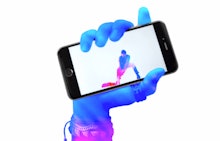Why the U2 Album Is Worth A Listen, Even If You Hate U2

Sporting a mullet and belting in front of 1.5 billion people, Bono wants you to think about Africa. Lying next to a girl on a heart-shaped stage, Bono wants you to think about love. Running across the 50-yard line at the Super Bowl, Bono wants you to remember 9/11. Waiting in your iTunes, Bono wants you to remember why U2 matters.
Tim Cook, one year younger than Bono, wants you to buy a watch. Like Steve Jobs before him, he has his uptempo U2 rocker to sell it. But Cook went further: Behind "The Miracle (Of Joey Ramone)" is an uneven but full-hearted U2 album called Songs of Innocence, released by Apple to 500 million iTunes users simultaneously and for free.
If it sounds like a gift, you haven't been reading the Internet. Many have reacted angrily to U2's album, mocking Apple for affiliating with an irrelevant band. But what most have missed is that Apple and U2 are surprisingly similar — both are aging superstars from the 1980s who want us to believe their products still can change the world. Why, then, are we more interested in paying $349 for a watch than we are in listening to a U2 album?
Most of us know enough about Bono and his heart-shaped stages to hold U2 at arm's length. Heart on their sleeves, secular but in a religious way, this is not a band you can be apathetic about. BuzzFeed called the release "history's most high-profile spam campaign," posting three articles in 24 hours: "Should You Actually Listen to The Album U2 Gave You for Free?" (not really), "People Were Less than Psyched About U2 at the Apple Event" (would you say they were freaking out?) and "Apple Just Put U2's New Album in Your iTunes Library and Everyone Is Freaking Out." Pitchfork ran a scathing article of fake song titles. Over at the New Yorker, pop music critic Sasha Frere-Jones reviewed the record by unfavorably comparing each track with its equivalent on Beyoncé's own surprise album. He even warned U2, "Don't talk about Joey Ramone." Surely Mr. Ramone would appreciate the defense, were he not dead after speaking to Bono on his death bed and then listening to a U2 song as his last.
The same culture that mocks U2 for their outsized ambition has watched a 10-minute-long video of a watch twiddling its own knobs over 1.1 million times in two days. The scratchy British voice of the video's narrator, celebrity Apple designer Jony Ive, has proved as seductive for Americans today as Bono's Irish tenor circa "With or Without You."
But most criticisms of U2 (self-serious, overblown, unoriginal of late, responsible for a generation of imitators) could just as easily be leveled against the Apple of 2014. On the surface, deciding how we feel about the two seems simply a choice between products — and Apple Watch may well be a better watch than Songs of Innocence is an album — but both Apple and U2 want this to be about much more than product choice. People preemptively rejected U2's album simply because the band believed they could do for you in sound what Apple thinks its watch can do in apps. Apple calls the Watch its "most personal device" ever, Bono calls Songs of Innocence U2's “most personal album.” Tim Cook wants to put the universe on your wrist; U2 wants it in your heart.
After U2 finished their lackluster performance at the Apple keynote, Cook walked out onto the stage and asked, "Isn't that the best single you've ever heard?" (It isn't — it's one of the worst songs on the album.) Bono awkwardly looked at the ground, stuttering through the announcement of the partnership. Then, surely going off-script, he said, "We are the blood in your machines, oh Zen master Tim Cook."
It was a tense exchange. Apple and U2 are alike in their limitless ambition, but in the most important way, their methods, they differ. Apple wants to change your life by fulfilling your desire for efficiency and simplicity. U2 want to change your life by making you believe — in a god, in love, in music, in yourself or, yes, in U2. When the Macintosh entered the market, Steve Jobs called it "the computer for the rest of us." Bono and co. shipped Songs of Innocence to our computers unbidden because it's meant to be a record for all of us.
It's a fine record, but that's not the point. It's easy to be suspicious of men who earnestly wish to tell half a billion people, as Bono sings on "California," that "There's no end to grief / That's how I know … That there is no end to love." But whether or not you trust Bono, somebody thought half a billion people might love the same record as much as they loved a $349 watch. That is a ridiculous, wonderful idea. It deserves to be heard.